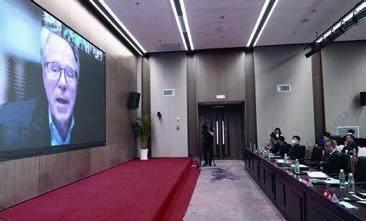SHARING THE PIE IN THE SKY
By Li Qing

Since Soviet Union astronaut Yuri Gagarin became the first person to fly in space in 1961, the exploration of the universe has changed stupendously. In 2001, Dennis Tito, a U.S. billionaire, reportedly paid $20 million for an eight-day trip in space, becoming the worlds first space tourist.
Although the price of a sevento-nine-day space trip has since jumped to $57 million, the global space travel market still has a huge demand, Wu Ji, a researcher with the National Space Science Center of the Chinese Academy of Sciences, said at a workshop on China-U.S. commercial space dialogue during the China Space Conference held in east Chinas city Nanjing on April 25.
The workshop was jointly organized by three NGOs from China and the U.S.—the Chinese Society of Astronautics, Caelus Foundation and the Secure World Foundation.
American spaceflight company Virgin Galactic, one of the first to jump into the fray, said early last year that it had nearly 8,000 online registrations of interest from 60 countries and territories. At that time, the plan was to launch its first commercial space tourism flights in 2021, with a 90-minute journey to cost $250,000. However, the launch was postponed to “early 2022” and since then, there has been no update.
“The service will be initially accessible to those with immense wealth,” Wu said.“But in the future, space tourism should be affordable for the rich, if not the middle-income group.”He hoped that with the development of the industry and technology, Chinese companies will also capture a slice of the international space tourism market. “Commercial programs can help lower costs and improve the efficiency of space activities, which will also benefit the traditional players in this area,” he said.
A nascent sector
However, unlike the U.S., which has veteran companies exploring space such as Elon Musks SpaceX, established as early as in 2002 with the goal of establishing colonies on Mars, Chinas commercial space industry is still in the primary stage, Zhao Qiming, a researcher with the Third Institute of China Aerospace Science and Industry Corp. (CASIC), said.
A white paper on Chinas space activities released in 2017 stressed the importance of non-governmental capital in space-related activities, including research and production, space infrastructure, information products and services, and satellite application, to enhance the commercialization of the space industry.

